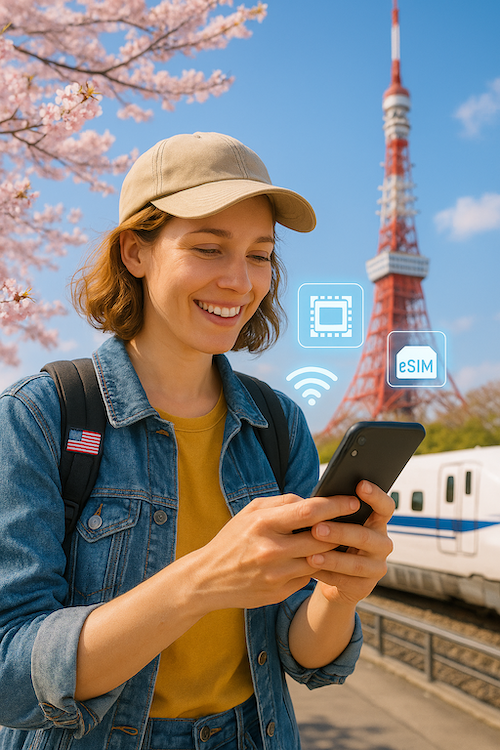
A rail pass, a pocket full of yen, and an internet connection you can count on—those three things transform a good Japan trip into a great one. While the shinkansen whisks you from neon-lit Tokyo to the bamboo forests of Arashiyama, you’ll want maps, translation apps, and streaming playlists to work without a hiccup. Roaming with a U S carrier costs a small fortune, and hunting for public Wi-Fi gets old fast. Enter the eSIM: a tiny digital SIM you install in minutes, giving you local-level data speeds without the plastic card or paperwork.
Below is everything you need to know, told in a travel-blog tone—but with the practical detail that saves dollars and headaches.
What Is an eSIM, Anyway?
An eSIM (“embedded SIM”) lives on a chip soldered inside modern phones. Instead of swapping a thumbnail-sized card, you scan a QR code or paste an activation code. Your handset then downloads a profile that behaves exactly like a physical Japanese SIM:
- Local data rates & coverage
- Instant activation—often before you leave home
- No pocket of tiny tools and fragile trays
Because the profile is software-based, you can store multiple eSIMs and toggle them on or off. Keep your U S number for iMessage and voicemail, but route all data through the Japanese plan—no roaming shock when your bill arrives.
Does My U.S. Phone Support eSIM in Japan?
Almost any handset sold in the States since late-2020 will handle at least one eSIM, and the newest iPhones ship with only eSIM slots. Still, double-check before you hit “purchase.”
Quick compatibility checklist
Brand & Series | eSIM Capable | Notes |
Apple iPhone XS (2018) onward | Yes | U.S. iPhone 14/15 = eSIM only |
Samsung Galaxy S20, S21, S22, S23 | Yes | U.S. carrier-locked models require “Carrier Unlock” first |
Google Pixel 4a onward | Yes | Straightforward setup via Settings → Network & Internet |
Motorola edge+ (2022) | Yes | Dual-SIM standby works fine |
Older/Pre-2018 phones | Very unlikely | Invest in a pocket Wi-Fi instead |
If your device isn’t on the list, open Settings and search for “eSIM” or “Add Cellular Plan.” No result? You’re probably out of luck.
Setting Up Your eSIM Before You Take Off
- Buy the plan and check your inbox. After payment you’ll receive a QR or manual code—hang onto it like a boarding pass.
- Connect to reliable Wi-Fi. Home broadband is perfect; airport Wi-Fi is a risky last resort.
- Add cellular plan → scan QR → label it “Japan.” iOS and Android both walk you through in less than two minutes.
- Set “Japan” as your primary data line, but keep your U S number for calls/messages.
- Toggle “Data Roaming” on for the eSIM. Paradoxically, it must roam on the Japanese network to work.
- Land at Narita or Haneda, switch off Airplane Mode, and you’re live in under 30 seconds.
Pro tip: screenshot the setup instructions so you can reference them offline in mid-flight.
Pocket Wi-Fi, Roaming, Local SIM, or eSIM: Which Wins?
Option | Up-front Cost | Daily Cost | Setup Hassle | Gear to Carry | Best For |
Carrier roaming | $0 | $10–$15 | None | None | One-day business trips |
Local physical SIM | ¥1,500 | ¥500–¥800 | Moderate (store visit) | Tiny tray & pin | Budget backpackers with unlocked phones |
Pocket Wi-Fi rental | ¥5,000 deposit | ¥900 | Pick-up & return | A whole extra device + charger | Families connecting 3–5 phones |
eSIM | $0 | $2–$4 | Five-minute QR scan | Nothing extra | 1–2 travelers, unlimited data, zero gear |
The eSIM edges ahead for convenience and total trip cost, especially once you factor in U S credit-card acceptance and 24/7 English chat support.
Why I Pick Holafly’s eSIM for Japan
I’ve tested half a dozen providers from Tokyo’s Akihabara to the ski slopes of Hokkaidō, and Holafly keeps bubbling to the top. Here’s why:
- Truly unlimited data—no sneaky caps that throttle you mid-Shinkansen.
- Instant email delivery—I once activated while waiting in the TSA Pre✓ line at LAX.
- Hotspot allowed—stream your Switch or share with a travel buddy without extra fees.
- Flexible durations—5, 10, 15, 20, 30, 60, or 90 days. Extend from your phone if you decide to chase another bowl of ramen.
- U.S. payment flow—major cards, Apple Pay, and PayPal accepted; no passport scan required.
- 24/7 human chat—a real agent helped me change start dates at 2 a.m. JST when my flight was delayed.
Most readers worry about speed: I averaged 95 Mbps down in Tokyo and 45 Mbps in rural Kyōto Prefecture—plenty for Netflix in HD.
Five Pro Tips for Smoother Connectivity on the Ground
- Toggle your eSIM off during the flight to preserve the initial activation window.
- Run a speed test in the airport lobby. If it’s sluggish, reboot once—99 % of the time that fixes network registration.
- Add a secondary APN (“internet”) if you can’t get data in very remote areas; NTT Docomo’s network often kicks in automatically.
- Use dual-SIM wizardry. On iPhone, set “Cellular Data Switching” to automatic so iMessage stays on your U S line, but web traffic flows through the eSIM.
- Screenshot the QR code and store it in an album named “eSIM.” If you reset your phone, you may need to re-add the plan.
Frequently Asked Questions
Will my Verizon iPhone 15 Pro Max accept a Japanese eSIM?
Yes. U.S. iPhone 14/15 models are eSIM-only and fully unlocked out of the box.
Does Holafly throttle after 20 GB?
No. Speeds may dip during network congestion, but there’s no hard cap or pay-more tier.
Can I share data with my spouse’s laptop?
Absolutely. Enable Personal Hotspot; the unlimited allowance covers tethering.
Is 5 G available?
Tokyo, Osaka, Kyoto, and Sapporo enjoy broad 5 G. Elsewhere you’ll fall back to fast 4 G LTE.
The Bottom Line
Japan rewards spontaneity: hopping off at an unknown station because the lanterns looked pretty, wandering into an alley ramen shop with no English menu, or catching a local festival you’d never planned on. Having a rock-solid data connection makes those detours frictionless—Google Maps still guides you home, and a quick translation helps you pay with Suica.
Among all the connectivity options, eSIMs combine the low cost of a local SIM with the zero-hassle setup of carrier roaming. For U S travelers in 2025, Holafly’s eSIM for Japan hits the sweet spot: unlimited data, instant delivery, and human support that won’t leave you on hold. Install it before you fly, and the moment your plane’s wheels kiss the Narita runway, Japan is at your fingertips—no lines, no paperwork, no roaming shock—just pure, carefree exploration.











